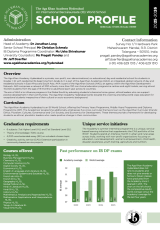The Modern Literature in Translation Club - Author of the Week: Mr. Chandrashekar Indla
At the Modern Literature Club, we deconstruct and analyse translated texts to develop an appreciation for how language constructs meaning and illustrates the human condition. In an effort to bridge the gap between readers and writers, and explore translated Telugu literature in greater depth, we invited Mr. Chandrashekar Indla to kickstart the ‘Author of the Week’ of the MLT Club. Besides being known and loved as the Theatre teacher at AKA,H, Mr.Chandra is a rising luminary amidst contemporary Telugu literature. During our session, we explored ‘Pachaku Season’, one his most celebrated short stories, translated by Aswini Ravula into Smoked Hopes.
The narrative follows four isolated stories on villagers in a tobacco village, all linked together with the shared themes of familial adversity, rural community spirit, and the vicissitudes brought about by the tobacco harvesting season. Documenting struggles, ubiquitous amongst tobacco villages, the stories are non -fictions, which facilitated the central theme of our discussion – the portrayal of “reality” in literature. Mr Chandra is categorical in his belief that authentic literature demands that every unripe and unpolished detail be recounted without creative alteration on the author’s part. He believes that altering the story, even if it's for the purpose of avoiding censorship, would hinder the audiences’ emotional and intellectual engagement with the story. His works are hence a world apart from much of the stylized stories of mainstream Western literature – the colloquial phrases and the ‘crude’ dialect may come across as shockingly raw to readers. Contrary to the works set in a similar socio-cultural context, Mr Chandra tells us, Smoked Hopes doesn’t portray explicit conflict between the “virtuous” and the “evil” or point fingers – it recounts the truth with objective factuality and bestows readers with the task of interpreting it . Unsurprisingly, Mr Chandrashekhar admitted that he didn’t often consider his role in created literary knowledge as that of an activist, advocate, or judge, but rather a storyteller with a purpose to inform- an aim delicately reflecting Chinua Achebe’s belief that the duty of postcolonial literature is to “re-educate and regenerate”.
Shifting the spotlight to authorial choices and language, we considered the story’s non-linear plot line and choice of diction. Mr Chandra explained the prominent use of profane expressions in Smoked Hopes by explaining how the “inappropriateness” of a word is determined by the reader. In its regional context, these words raise no eye brows. This brought us to the concept of ‘Censorship’ and the danger it poses to the authenticity of a work. Mr. Chandra stresses on the difficulties of using dialect in mainstream literature, as censoring words can often hinder the delivery of the emotion and intent. One risks something similar when translating into English as its rules, regional influences, and construction are entirely dissimilar. Manifested in the Epigraph’s change from “Pachaku season” to “Smoked Hopes”, words that have no English counterpart (with similar appeal), and the fundamental emotions enabled by the dialect, get lost in the translation.
We invited some questions from the audience. While responding to Ms.Koel Ray’s question on the nature of suffering and the act of writing, Mr.Chandra spoke about the cathartic nature of literature. He admitted that some of his most profound, emotionally charged stories were written during times of personal emotional turmoil. Published or not, these works were an instrument for his liberation from himself. In response to the element of ‘performance’ in his narrative orientation, pointed out by Mr.Sudeep Ghosh, Mr.Chandra claimed that his experience in theatrical direction and acting infused his works with a sense of performative realism, begetting his utilization of vivid imagery and thought–provoking metaphors. Ms.Neeraja, commenting on the depiction of reality in these stories, made succinct observations on the nature of depth in these stories. She cited a phrase ‘colourful darkness’ to bring out the role of dialects, metaphor, satire and the nature of affective language.
The session enabled us to grapple with and reflect on concepts like representation, censorship and catharsis. While hoping that this intense discussion brings about insightful reflections, we look forward to exploring intertextual connections and furthering our literary pursuits. We sincerely thank Mr. Chandrashekar for giving us time and for opening doors to modern literature in Telugu.
The session, moderated by Harshita Devavarapu (DP2) and Jacintha Thota(DP1), was attended by the members of the MLT Club and the Telugu Club.
Harshita Devavarapu (DP2) and Jacintha Thota (DP1)





